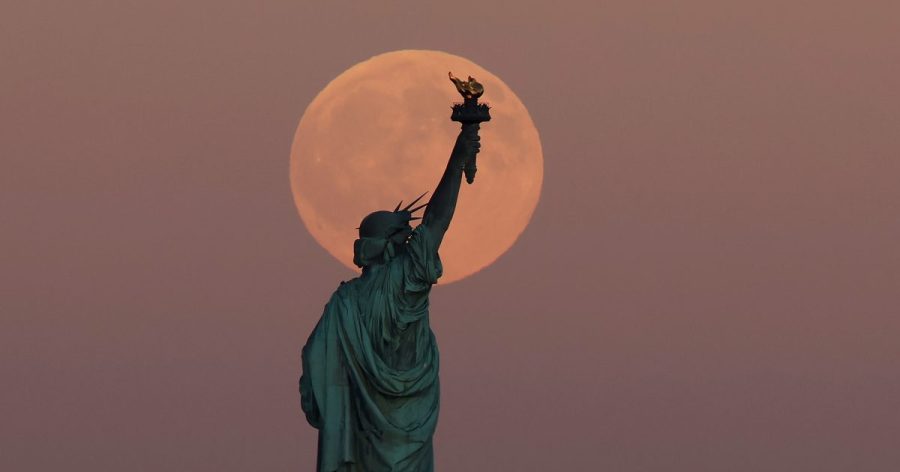Top Stories
Scientists Confirm Full Moon Disrupts Sleep Patterns: What to Know

UPDATE: New research confirms the full moon can disrupt sleep patterns, leaving many feeling restless during its luminous nights. As the Harvest Supermoon rises behind the Statue of Liberty in New York City on October 6, 2025, experts stress the importance of understanding this phenomenon.
Studies show that in the nights leading up to the full moon, people experience an average 20 minutes less sleep. They take longer to fall asleep and spend significantly less time in deep, restorative rest. This pattern is consistent across various cultures and has been confirmed by large population studies, with individuals reporting later bedtimes and shorter overall sleep duration.
The primary culprit? Moonlight itself. The bright illumination can interfere with the body’s natural circadian rhythms, reducing melatonin production—the hormone responsible for signaling bedtime. This effect is particularly pronounced in rural areas, far removed from artificial light pollution.
While minor sleep disruptions are common, the implications for mental health are more profound. Sleep loss is a known trigger for anxiety and mood disorders. Individuals already vulnerable, such as those suffering from bipolar disorder or schizophrenia, may be at heightened risk during the full moon phase.
Despite long-standing folklore linking the full moon to increased psychiatric issues, evidence remains inconclusive. Recent studies from India and China suggest slight upticks in psychiatric hospital admissions during full moons, but these findings lack consistency and may be influenced by cultural factors or local practices.
The science indicates that while the full moon may shave off a bit of sleep, the direct link to psychiatric crises is tenuous. The real concern lies in the cumulative effects of sleep loss, especially for those predisposed to mental health challenges.
Researchers emphasize that the full moon’s influence pales in comparison to the impact of modern artificial light sources on sleep quality. Psychologists attribute the enduring belief in the “full moon effect” to illusory correlation—people tend to remember bizarre events coinciding with full moons while overlooking the mundane nights.
As the full moon casts its glow tonight, experts urge individuals to take note of their sleep environment. Strategies to mitigate light exposure, such as reducing screen time before bed and using blackout curtains, can be crucial for maintaining healthy sleep patterns.
The message is clear: While the moon’s brightness may affect sleep, the true disruptors often lie closer to home. As we continue to navigate the challenges of modern life, prioritizing sleep health remains essential for overall well-being.
Stay informed as more studies emerge on this fascinating topic and how lunar phases could impact our nightly rest.
-

 Science1 week ago
Science1 week agoInventor Achieves Breakthrough with 2 Billion FPS Laser Video
-

 Top Stories2 weeks ago
Top Stories2 weeks agoCharlie Sheen’s New Romance: ‘Glowing’ with Younger Partner
-

 Entertainment2 weeks ago
Entertainment2 weeks agoDua Lipa Aces GCSE Spanish, Sparks Super Bowl Buzz with Fans
-

 Business2 weeks ago
Business2 weeks agoTyler Technologies Set to Reveal Q3 Earnings on October 22
-

 World2 weeks ago
World2 weeks agoR&B Icon D’Angelo Dies at 51, Leaving Lasting Legacy
-

 Entertainment2 weeks ago
Entertainment2 weeks agoMother Fights to Reunite with Children After Kidnapping in New Drama
-

 Science2 weeks ago
Science2 weeks agoNorth Carolina’s Biotech Boom: Billions Invested in Manufacturing
-

 Health2 weeks ago
Health2 weeks agoCurium Group, PeptiDream, and PDRadiopharma Launch Key Cancer Trial
-

 Health2 weeks ago
Health2 weeks agoCommunity Unites for 7th Annual Into the Light Walk for Mental Health
-

 Entertainment2 weeks ago
Entertainment2 weeks agoRed Sox’s Bregman to Become Free Agent; Tigers Commit to Skubal
-

 Top Stories2 weeks ago
Top Stories2 weeks agoDisney+ Launches Chilling Classic ‘Something Wicked’ Just in Time for October
-

 Health2 weeks ago
Health2 weeks agoNorth Carolina’s Biotech Boom: Billions in New Investments









